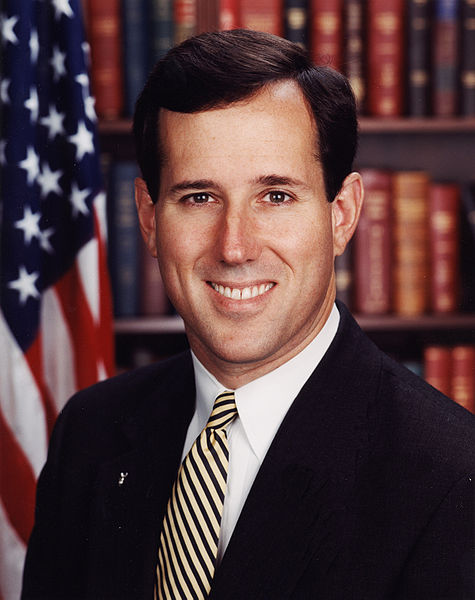Rick Santorum is serious about foreign policy. On Thursday, he’ll give a major address on the topic, taking his presidential almost-campaign away from its focus on social issues and inadvertent gay poet endorsements for a moment, to turn his gaze to the wider world.
“Not only was I in the Senate for 12 years, but I was very, very active in national security issues and actually took the lead on a lot of national security issues, particularly focused on the Middle East, which is not just the hot spot now but an ongoing hot spot,” Santorum, who also chaired the Armed Services Committee, told the Pittsburgh Post-Gazette recently.
And looking back at Santorum’s foreign policy past, it’s true that he’s taken many strong stands…
Kosovo: In 1999, while many people were celebrating NATO’s victory over forces led by the late Yugoslavian strongman Slobodan Milosevic, Santorum cried foul. He “rejected any notion of a NATO victory,” according to the the Allentown, PA Morning Call.
While many Republicans opposed President Clinton’s American-led air campaign against Milosevic’s forces, those currently living the Republic of Kosovo as well as many political leaders at the time felt differently, calling the NATO action a win over Milosevic, who would eventually be prosecuted for war crimes at The Hague.
As the Morning Call put it in 1999, Santorum’s position on the war “buck[ed] widely held views.”
Iraq: In 2006, Santorum took to the airwaves to proclaim that the U.S. had found weapons of mass destruction in Iraq. “We have found weapons of mass destruction in Iraq, chemical weapons,” he said in a June 22 press conference, citing a declassified report by the National Ground Intelligence Center, an intelligence unit in the Defense Department. He even slammed Senate Democrats who had disputed that the weapons were found: “This is an incredibly — in my mind — significant finding. The idea that, as my colleagues have repeatedly said in this debate on the other side of the aisle, that there are no weapons of mass destruction, is in fact false.”
Here’s video of Santorum on Fox News that same week, saying more of the same:
In September of 2006, Santorum admitted that “as far as we know” Saddam Hussein had nothing to do with September 11th, and acknowledged that the weapons found were older weapons. But he did maintain that Iraq was a “grave danger” to the United States, telling NBC’s Tim Russert: “I believe that it was a war of necessity because it–they are a–they were a threat. It is important that we are in the, the Middle East right now and, and confronting this broad war that we are involved in against Islamic fascism.”
Iran: In the same interview, Santorum sounded the alarm over Iran, saying it was “stoking” sectarian violence in Iraq. “Iran is the one that’s causing most of the problems in Iraq. It is causing most of the problems, obviously, with Israel today. It is the one funding these organizations. And is the country that we need to focus on in this war against Islamic fascism.”
More recently, and possibly in anticipation of a run for president in 2012, Santorum has pivoted to harsh criticism of President Obama’s foreign policy.
“Jihadism”:In February, he told CPAC conference attendees that President Obama “doesn’t believe America is exceptional,” sees America as a “force for disruption, and even evil,” and won’t “say that jihadism is evil.”
“He doesn’t say that Jihadism is evil,” Santorum added. “He doesn’t say that sharia law is incompatible with western civilization and the United States, which they are.”
Libya: Santorum has accused the President of being “detached” and “indecisive” about intervening in Libya, and said in March that Obama was letting the United Nations lead him. “[T]here’s one thing to engage the international community in something you want done. It’s another thing to follow the international community,” he said on Fox News. “I think that’s what happened here – not the president leading.”
More Iran: Just this week Santorum accused the President of siding with the Iranian government during the protests that followed Iran’s disputed elections two summers ago, and blamed him for the so-called Green Revolution’s failure. “What did the President of the United States do,” he asked a crowd in Iowa. “Did he side with the revolutionaries like he did in Egypt? Did he side with the revolutionaries like he’s done in Libya? Did he side with our enemy? Did he side with the people who are killing our soldiers in Iraq and Afghanistan? Yes. That’s what he did. And as a result, that moment passed.”
Holy Wars: And, of course, there was the time Santorum got all medieval with his foreign policy, saying in February that the Crusades really get a bad rap. “The idea that the Crusades and the fight of Christendom against Islam is somehow an aggression on our part is absolutely anti-historical,” he said. “And that is what the perception is by the American left who hates Christendom.”






